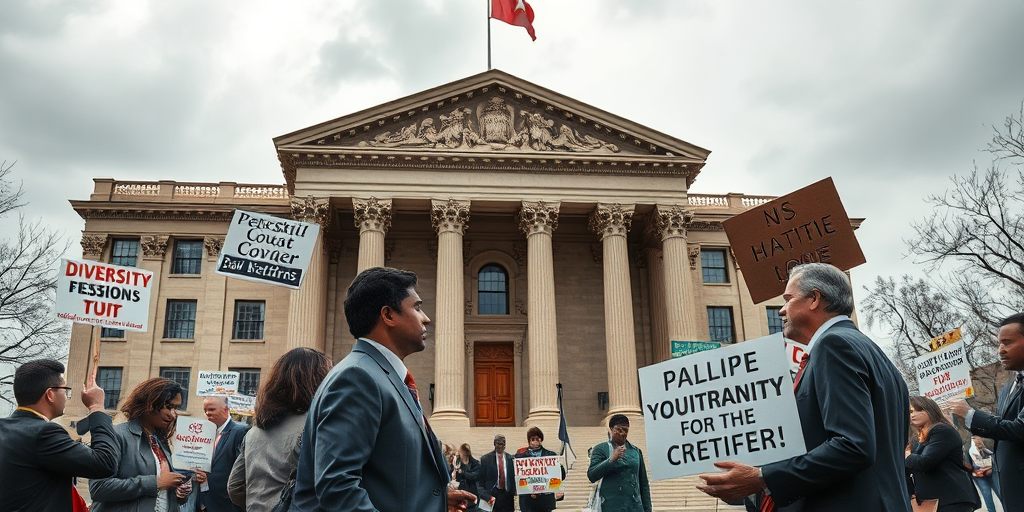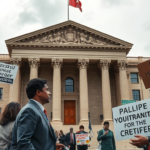Lawsuit Challenges Diversity Scholarships at Southfield Law Firm
In a legal confrontation with potential nationwide implications, national groups challenging affirmative action have filed a lawsuit against Southfield-based law firm Buckfire & Buckfire PC. The suit, initiated by the American Alliance for Equal Rights (AAER) and Do No Harm, alleges discrimination against white students in the firm’s diversity-focused scholarship programs. Filed in U.S. District Court in Detroit, this case captures significant local interest as it echoes broader debates over affirmative action across the United States.
Details of the Case
At the heart of the lawsuit are two $2,000 scholarships awarded to a Latina law student and an Asian American medical student. According to the legal claim, three white applicants who also met eligibility criteria were wrongfully excluded. The lawsuit contends that these scholarships violate federal law by factoring in race, color, and ethnicity, which the plaintiffs argue is discriminatory.
Lawrence Buckfire, president of the law firm, dismissed the lawsuit as a politically motivated attack, asserting that the candidates represented in the case were not as qualified. “They are poor candidates for these scholarships,” he stated, arguing that the suit mischaracterizes the nature of the programs.
Background and Community Impact
The contested scholarships aim to support students from underrepresented communities. The Latina law student, recognized for her community engagement and family contributions after her father’s passing, and the Asian American medical student, an immigrant from the Philippines who spearheaded a skin-care initiative for a largely Spanish-speaking community, both demonstrate the kind of community-focused impact Buckfire & Buckfire seeks to promote.
In a community as diverse as Southfield, this lawsuit raises questions on the validity and future of diversity-based initiatives. Residents, some of whom benefit directly from such scholarships, see these opportunities as essential for fostering educational and professional growth among minority groups.
Speaking to Woke News, local resident Teresa Gomez expressed her concerns: “Diversity scholarships have opened doors for many in our community. Challenging them feels like a step backwards.”
Connections to Broader Issues
This local case ties into a wave of national efforts challenging affirmative action, highlighted by AAER’s involvement. Led by Edward Blum, famed for his role in a Supreme Court ruling against race-based college admissions, AAER’s current focus underscores a wider push against diversity considerations in various sectors.
Additionally, the involvement of Do No Harm reflects ongoing debates within the medical community over diversity, equity, and inclusion policies. These discussions reverberate in Southfield, influencing medical institutions and community health initiatives.
Potential Implications
Should the case proceed, its outcomes might set precedents affecting not only local scholarship policies but also similar programs nationwide. Local universities and organizations with diversity-focused initiatives could face legal challenges, reshaping the educational landscape.
Buckfire fears this case is a strategic effort by AAER and similar groups to escalate issues to the Supreme Court. “They are looking for litigation that fits their agenda,” he noted, highlighting the selective nature of such lawsuits.
Furthermore, the case could influence public perception of diversity initiatives across sectors. Whether seen as essential for equality or as discriminatory, reactions to this lawsuit could impact the future direction of diversity policies within Southfield and beyond.
Balanced Perspectives
Opinions on the lawsuit vary sharply. Supporters of AAER’s actions argue for the need to eliminate race-based distinctions, viewing them as counterproductive to true equality. However, proponents of diversity scholarships caution against overlooking historical and systemic challenges faced by minority communities.
Legal expert Dr. John Hamilton from Wayne State University advises considering both legal foundations and social consequences. “It’s crucial to assess the legal arguments while recognizing the real-world impact on affected communities,” he said.
Local Resources and Contact Information
For residents seeking more information or wishing to express their views, the Southfield City Council will hold an open forum next month. Meanwhile, Buckfire & Buckfire encourages local engagement and offers details about their scholarship criteria and application process on their website.
As the legal proceedings unfold, the case underscores ongoing tensions between diversity initiatives and legal interpretations of equality. Maintaining an objective perspective, residents and stakeholders are urged to stay informed and involved, ensuring community interests remain a focal point in this developing story.







